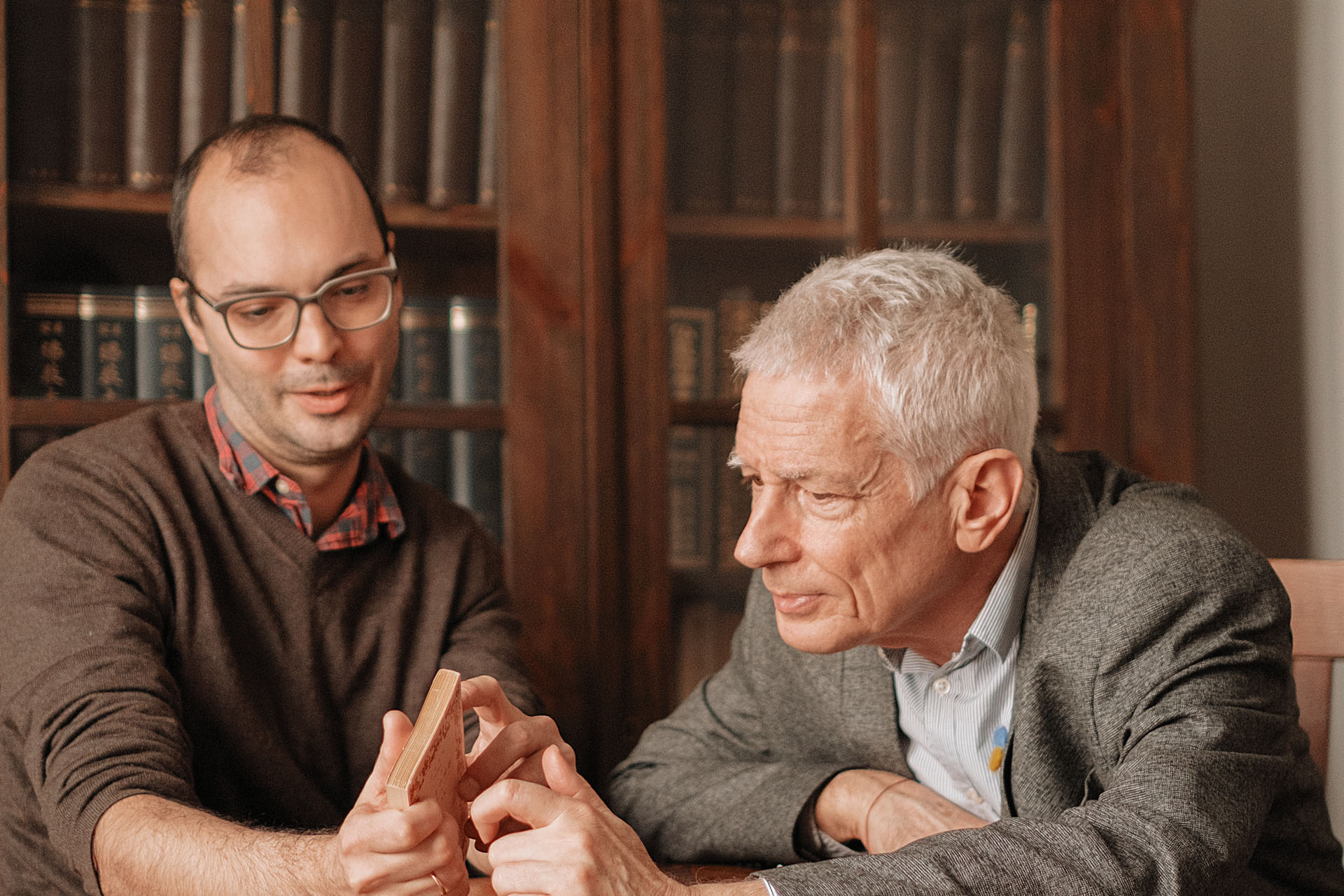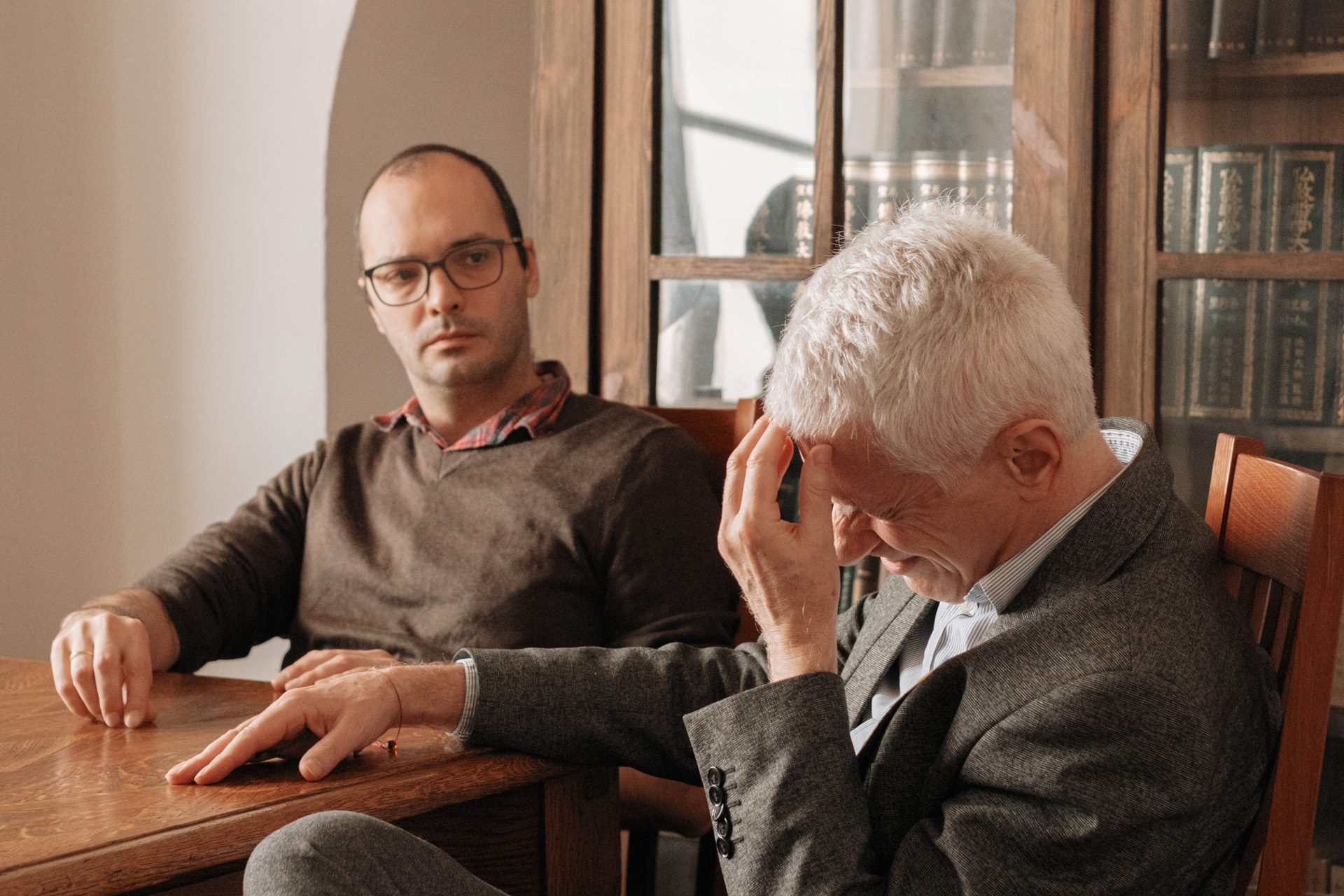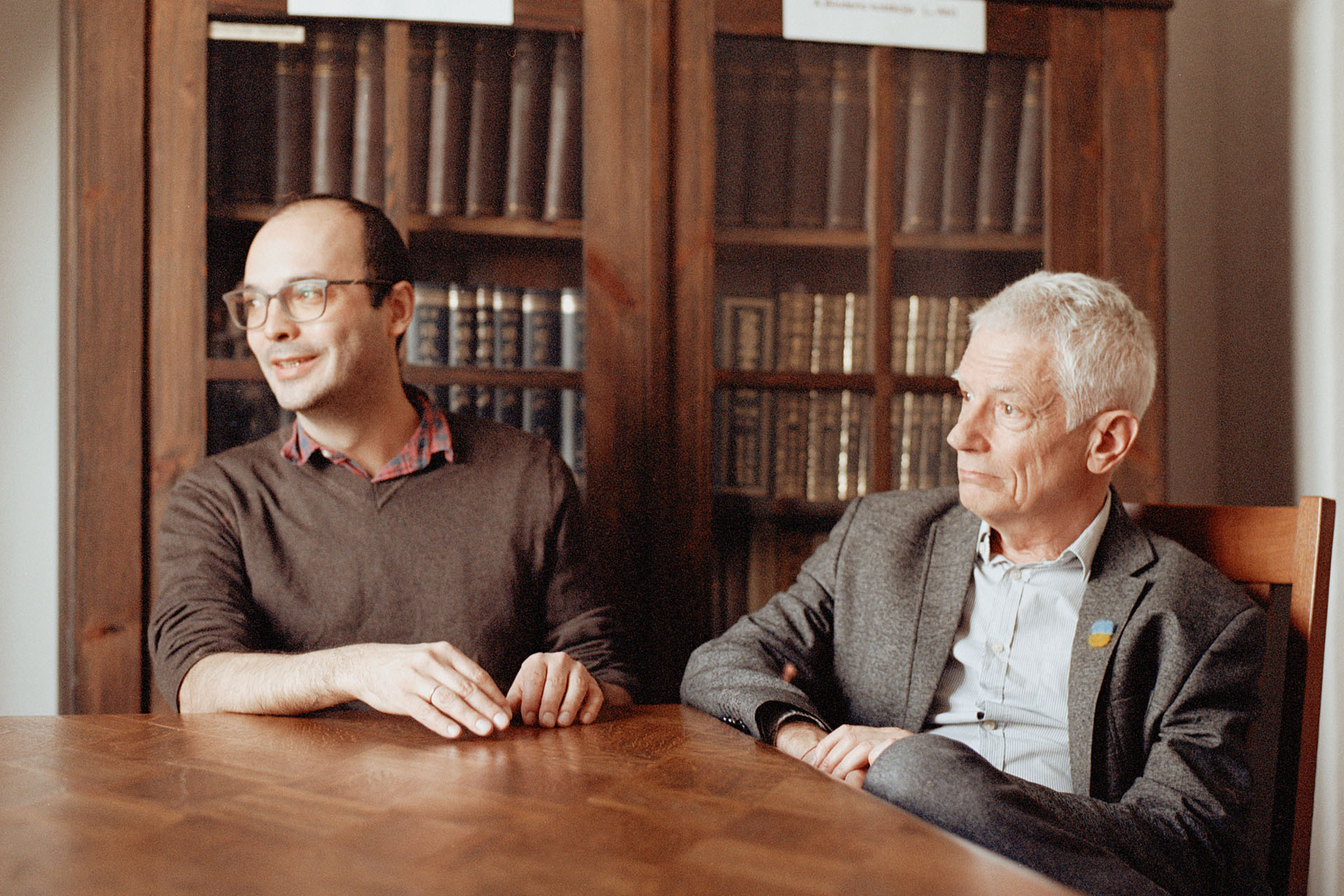VU Linguists: The Lithuanian Language Should Be Allowed to Develop Spontaneously
 Some try to learn about the world by following in the footsteps of the evolution of space, while others are interested in artificial intelligence, but there are also those who look for answers in language. Among the latter are Axel Holvoet, an outstanding professor from Vilnius University (VU), and Dr Vladimir Panov. However, there are still many false myths about the profession of a linguist. The researchers met at VU to talk about the actual work of linguists, what they do and why they are considered as the “language police”.
Some try to learn about the world by following in the footsteps of the evolution of space, while others are interested in artificial intelligence, but there are also those who look for answers in language. Among the latter are Axel Holvoet, an outstanding professor from Vilnius University (VU), and Dr Vladimir Panov. However, there are still many false myths about the profession of a linguist. The researchers met at VU to talk about the actual work of linguists, what they do and why they are considered as the “language police”.
“How do you say ‘now’ in Dutch?” Dr V. Panov asked the professor as soon as they sat down in the VU Observatory Courtyard, ignoring the cameras.
“Nu,” replied Prof. A. Holvoet immediately.
Both men – Prof. A. Holvoet and Dr V. Panov – are united by a passion for linguistics. A. Holvoet is a polyglot and a professor of linguistics from Belgium. The professor has organised the Academia Grammaticorum Salensis Summer School of Linguistics in Lithuania for almost 20 years now, with the participation of Lithuanian and foreign students, as well as doctoral students and researchers from Europe, America and the Middle East, with lectures by prominent linguists. It was at this summer camp that the relationship between him and Dr V. Panov began, who is a specialist in language typology and also a polyglot.
“As soon as I found out about the summer camp, I wanted to be involved. I approached Axel and asked if he would agree to become my academic supervisor. He agreed and we ran the project together for two years,” Dr V. Panovas recalled.
“I was very impressed by Vladimir’s desire to find new ways of gaining insights. After working in one place for a long time, researchers often get stuck in one area. They delve into that subject, but sometimes lose a broader outlook. To me, Vladimir is an example of someone who is constantly looking for new ideas,” said Prof. A. Holvoet when asked about his student’s best qualities.
“How do you say ‘now’ in Dutch?” Dr V. Panov asked the professor as soon as they sat down in the VU Observatory Courtyard, ignoring the cameras.
Linguistics is the science of the natural human language. It involves a complex and wide field of cognition, and studies of language in various aspects: from the simplest teaching to the nature of language and its connections with human consciousness, i.e. exploring our own essence.
“The ability to speak is about knowledge, but it is also about the unconscious. A Lithuanian person speaks Lithuanian without thinking about it. If we asked the average person: ‘Why did you use the past tense and not the present?’ we would probably hear the answer: ‘It just felt right.’ Hence, understanding what intuitive conscious linguistic knowledge is, as well as its nature and structure, is the fundamental question of linguistics. Trying to answer these questions is only possible by studying and exploring as many languages as possible, trying to see how they differ, and what is or could be universal, in order to get closer to understanding what a language is,” Prof. A. Holvoet said.
The prevailing view is still that a linguist is a person who merely explains the proper way of writing or speaking. However, Prof. A. Holvoet stressed that linguists do not engage in the standardisation of language. On the contrary, linguists are generally very sceptical about any attempt to standardise the language.
“When the state of Lithuania was established the residents, and even writers, wrote in their own dialects: some used the Highlands dialect and others Samogitian – thus, the need for a standardised language emerged. This meant that some regulations were needed at the time. But today, both the Lithuanian language and the society that uses it has matured. Writers, journalists and various cultural figures use the language very creatively. Therefore, the time has come when the Lithuanian language should be allowed to develop spontaneously. Writers, publicists and ordinary people will all shape and creatively enrich this language,” Prof. A. Holvoet is convinced.
The Lithuanian language is doomed to only exist in dictionaries, the Lithuanian language is deteriorating and will disappear due to emigration, and children no longer need the Lithuanian language – these and other similar fears come from identifying a language simply with words, according to Dr V. Panov. The researcher ensured us that there is no threat to the Lithuanian language, as the language cycle remains the same: children are born whose mother tongue is Lithuanian, and those children will likely speak Lithuanian to their children when they grow up.

According to Dr Panov, threats to a language only arise when the younger generation begins to speak another language to one another, and no longer uses their mother tongue at home. Although Lithuania is not facing this threat, many minority languages are disappearing throughout the world: “The Basque language, for example, is in danger of extinction because there are far more native speakers from the older generation than from the young generation. Although an effort is being made to revive the language, it has been problematic and not very successful. There are also success stories, but the revitalisation of a language is also closely linked to political matters.”
The emergence of new ways of speaking is one of the notable consequences of the migration to Europe. For example, if an adult immigrates to Lithuania, it is likely that his or her knowledge of Lithuanian will always be imperfect. On the other hand, the immigrant children growing up among Lithuanian-speaking people will be able to speak Lithuanian fluently. They will also use neologisms.
Although human migration is ongoing, the current trends suggest that it will intensify. More and more people are talking about a larger influx of immigrants to both Europe and Lithuania, especially in the face of climate change and the Russian war in Ukraine.
“Contact between languages is a natural state of affairs, and it has always been this way. The functioning of a language within one country is an artificial concept, because in the old days national borders were not as strict as they are now. (...) All languages are somewhat mixed, and there is no development without contact between languages. It’s not something new – it has always been this way,” Prof. A. Holvoet said.
According to Dr V. Panov, it’s likely that there was even more contact between languages in the past than now, because there was no language regulation. According to the researcher, such regulations are a relatively new phenomenon and are a product of modernity. The main idea underlying the language policies of different countries is that the products of contact are evil, so they must be abandoned and the language must remain pure.
“This idea comes from the primordialist view that a nation is an unchanging unit that has always existed and will exist forever,” Dr V. Panov explained.
In response to the war in Ukraine, the VU Faculty of Philology has launched an initiative to help Ukrainian citizens learn a range of foreign languages. Students and teachers have voluntarily organised free English and Lithuanian language courses for beginners, and for those without basic language skills.
As Dr V. Panov pointed out, the best way to learn a language is by having the opportunity to use it. People fleeing war should be able to study a new language in a safe environment, where they can express themselves, speak up without any fear of making mistakes and receive support from other people. Then, their language skills will improve almost effortlessly.
“Therefore, the time has come when the Lithuanian language should be allowed to develop spontaneously. Writers, publicists and ordinary people will all shape and creatively enrich this language,” Prof. A. Holvoet is convinced.
“I got into linguistics gradually. At an early age, I became interested in languages and started learning them at school. My first real interest was Lego instructions written in foreign languages. When I was seven, I was fascinated by analysing the letters of unfamiliar languages. I eventually started to distinguish one language from another. In later grades, I was encouraged by my Latin teacher. At school, Latin is a kind of introduction to linguistics,” Dr V. Panov said, discussing his first steps toward becoming a linguist.
At first, the VU researcher did not intend to study linguistics but classical philology. However, he was always interested in classical languages as a linguist and not as a philologist. Therefore, he also attended all the linguistics courses the university had to offer. Finally, in 2011, he started working at the Institute of Linguistics of the Russian Academy of Sciences, where he became involved in typological research. Typology is a discipline that is focused on studying the world’s linguistic diversity.
“The broader goal for both typologists and linguists is to try to find out where language similarities come from,” Dr V. Panov said. There are different explanations for this. For example, a common view, especially in the United States, is a so-called generative grammar, where the similarities between languages are interpreted as innate knowledge. The pioneer and the most famous advocate of this tradition is the American linguist Avram Noam Chomsky.
A. N. Chomsky and his followers claim that people are born with minimal knowledge of a language. This means that as they grow older and listen to other people in their immediate environment, they refine that knowledge. For example, according to Dr V. Panov, an innate form of learning is conjugation. We hear others conjugate and then alter words into different forms – such as plural or singular types.

According to the linguist, another approach, which is opposed to generative grammar, is called functionalist (although there are many terms for it) and this is the one typologists usually follow. Advocates of this approach claim that language similarities stem from language use conditions and communication functions.
But the question of why languages are different is more difficult. According to the VU researcher, one of the most obvious answers is that’s just how it is.
“Languages change and the system we have now is simply a product of historical coincidence. On the other hand, is the direction of those changes entirely random? That’s yet another big topic in typology. The answer is – apparently, no. The key concept here is grammarisation. Language has lexis, words and grammar. The grammatical elements stem from words and lexical elements. Some examples are suffixes or prepositions,” explained the linguist.
“The broader goal for both typologists and linguists is to try to find out where language similarities come from,” Dr V. Panov said.Grammar is Prof. A. Holvoet’s specialism. Although, as he puts it, it’s a terrible sounding word, and we imagine the scholars studying grammar as constantly telling other people how to speak, in the linguistic sense, grammar has nothing to do with the regulation of language and the imposition of strict norms. According to Prof. A. Holvoet, we need grammar in order to speak.
“The grammar we learn at school tells us very little about this. At school, people learn that the Lithuanian language has an imperative slant, which inflects a direct command. But, for example, Vladimir could say something that I do not agree with, and I could say: ‘Well look at that! You’re speaking such nonsense.’
Is it a command, the phrase ‘look at that’? No. I just wanted to make a comment. It could be described as a productive construction. Lithuanian speakers have some knowledge of the relationship between linguistic form and linguistic meaning. But these things are not found in school textbooks. We don’t see explanations for how the imperative statement becomes something other than a command,” said Prof. A. Holvoet.
The relationship between linguistic form and linguistic meaning is very complex. “It is a complex phenomenon with a lot of riddles, so linguists are constantly arguing, and it is rare for everyone to agree on a universal answer,” said Prof. A. Holvoet.
“That’s the fun part. The arguing. We enjoy looking at one and the same thing from different perspectives. It’s a journey to an unfamiliar land and there is no way to know what surprises lie ahead, so there are no rules we have to follow. Our assumptions may prove unfounded at any time, and then we will have to change our whole approach. The next generation will come, those who are now in school, and will criticize me saying: ‘he didn’t understand anything, we’ll find a better solution’. And that’s how it should be, since that’s how academia works. You must build something and later it is rebuilt. Come and talk to us, criticise us, and create something new. That’s our dream,” Professor A. Holvoet revealed.
In recognition of the importance of developing a teacher-student relationship and having the courage to ask questions, VU is presenting an art project and a virtual exhibition, in collaboration with the documentary and portrait photographer Tadas Kazakevičius. The exhibition features a series of portraits of Prof. A. Holvoet and Dr V. Panov, revealing their sincere relationship.